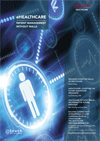
The transition towards eHealthcare, a vision of personalized healthcare that encompasses everything from patient empowerment to having a single slice-through view of the patient, will require a move away from an acute delivery platform to one that will focus more on managing the patient for life. This is a move towards healthcare 'without walls', where a connected healthcare delivery platform will be supported by greater use of patient-controlled data, the leveraging of health data through analytics, and empowered patient and physician communities. The adoption of disruptive technologies will also move treatment and patient management beyond the confines of the traditional institution. Increasing use of analytics layered over disparate data sources will help to transform the data mountain into actionable information. These are some of the exciting themes explored in eHealthcare - Patient Management Without Walls.
Download Introducing eHealthcare Patient Management Without Walls (.pdf, 1.599 KB).
Download from eHealthNews.eu Portal's mirror: Introducing eHealthcare Patient Management Without Walls (.pdf, 1.599 KB).
Related news articles:
- Oracle Healthcare Solutions' Profile
About Oracle
Oracle is the world's most complete, open, and integrated business software and hardware systems company. For more information about Oracle, please visit http://www.oracle.com.